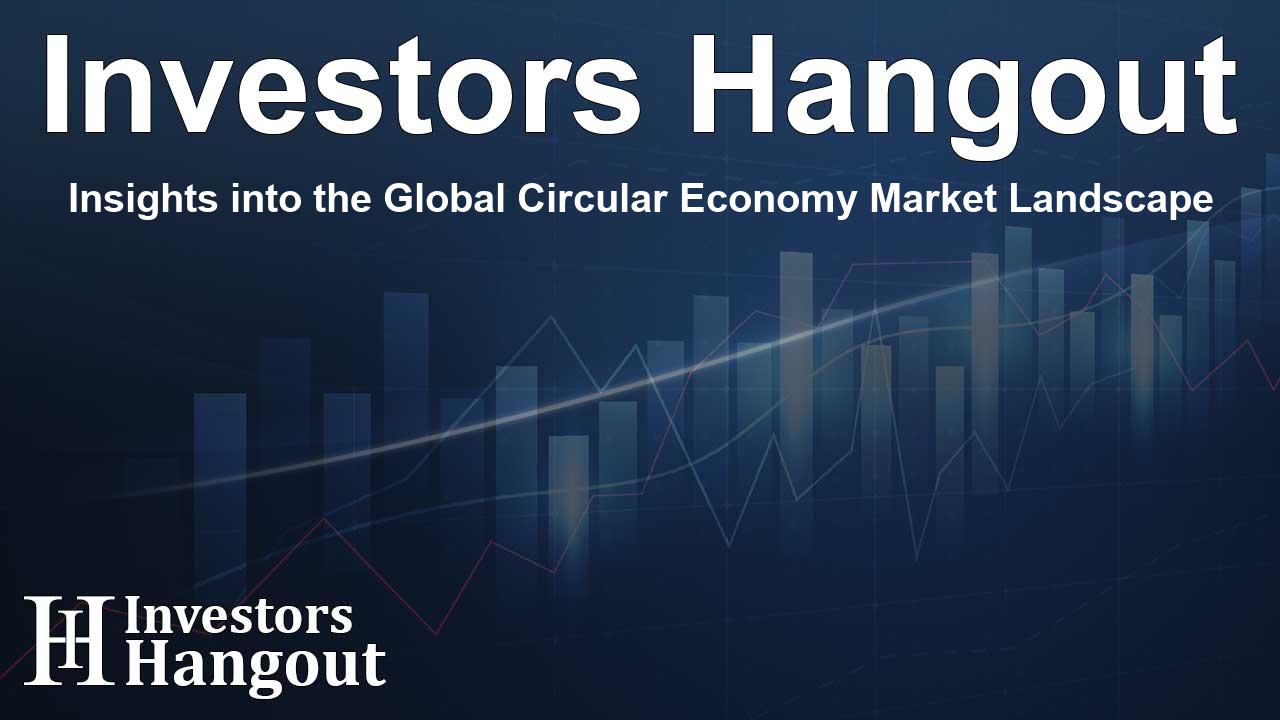Insights into the Global Circular Economy Market Landscape

Understanding the Circular Economy Market
The Circular Economy Market is defined by its segmentation across various dimensions such as types, enterprise sizes, and industries affected. This market encompasses Circular Products and Services, which are critical as organizations, regardless of size, strive to align with sustainable practices in manufacturing, consumer goods, waste management, and more.
The Impact of Environmental Awareness
As concerns about climate change and pollution rise, consumer and corporate behavior is evolving. This transformation is typically aimed at embracing practices that bolster sustainability. A significant driving factor for market growth in the circular economy sector is the escalating awareness regarding resource depletion and the imperative to minimize waste generation. The burgeoning population worldwide is amplifying this need, prompting industries to rethink their traditional business models.
Driving Factors Behind Market Growth
One of the principal catalysts for the growth of the circular economy market is the pressing demand for sustainable products. As resources such as fossil fuels and minerals become increasingly limited, companies are motivated to adopt circular economy strategies that favor the reuse and remanufacturing of materials. This approach not only conserves scarce resources but also reduces the environmental impact associated with extraction processes.
Government Initiatives and Regulations
Governments are on a mission to promote recycling and implement stringent regulations to curb waste generation. This regulatory environment is propelling industries to pivot toward circular economies, which prioritize materials reuse and refurbishment. For instance, roadmaps recently introduced in various regions focus on reducing plastic waste and promoting a transition to more sustainable practices.
Technological Innovations
Furthermore, advancements in recycling technologies are significantly enhancing market growth. Governments across the globe are establishing ambitious waste reduction targets and innovative recycling initiatives. These goals not only provide clear guidelines but also incentive structures that make recycling and circular operations more economically appealing. As a result, companies that invest in such practices may benefit from various fiscal incentives, making sustainability not just an ethical choice but also a smart financial strategy.
Current Trends Shaping the Industry
Several trends are currently prevalent within the circular economy market. Firstly, the manufacturing industry is seen as a major contributor, actively seeking to reduce waste and enhance resource utilization. The industry's move toward circular economy practices—such as remanufacturing and eco-design—offers vast potential for reducing costs and improving environmental footprints.
Regional Developments
The Asia-Pacific region has emerged as a leader in adopting circular economy practices. Countries like China and Japan are setting examples by integrating sustainable methods into various sectors, including waste management and manufacturing. With the increasing support from governments, businesses are motivated to implement these circular models, enhancing their operational efficiencies while meeting the demands of eco-aware consumers.
Competitive Landscape
The circular economy market is characterized by a diverse set of players. Key organizations, such as TOMRA and Veolia Water Technologies, are redefining the landscape with their innovative approaches and comprehensive offerings. Their strategic initiatives, including partnerships and technology investments, position them favorably in an evolving marketplace.
Recent Innovations
Recent advancements in the sector highlight the dynamic nature of the circular economy. Veolia Water Technologies and TOMRA, for instance, have introduced cutting-edge solutions aimed at improving waste management efficiency and sustainability. Such developments are indicative of the ongoing shift away from traditional practices and towards more integrated, eco-friendly approaches.
Conclusion
As industries increasingly adopt circular economy principles, the implications for growth are immense. The commitment to sustainability not only addresses environmental concerns but also aligns with the changing preferences of consumers, fostering a more sustainable future. By understanding this market's key segments, trends, and pressure points, stakeholders can better navigate the challenges and opportunities presented by the circular economy landscape.
Frequently Asked Questions
What is the Circular Economy?
The circular economy is a model that emphasizes the continuous use and recycling of resources to minimize waste and reduce environmental impact.
How does the circular economy contribute to sustainability?
It promotes resource efficiency and sustainability by encouraging the reuse and remanufacturing of materials, thereby lowering the demand for new resources.
Which industries are most affected by the circular economy?
Industries like manufacturing, consumer goods, and waste management show significant adoption of circular economy principles.
What role do governments play in the circular economy?
Governments implement regulations and incentives that encourage businesses to adopt sustainable practices and enhance recycling efforts.
Why is Asia-Pacific a leader in the circular economy?
Rapid industrialization, government support, and growing consumer demand for sustainable products position Asia-Pacific as a leading region in adopting circular economy practices.
About Investors Hangout
Investors Hangout is a leading online stock forum for financial discussion and learning, offering a wide range of free tools and resources. It draws in traders of all levels, who exchange market knowledge, investigate trading tactics, and keep an eye on industry developments in real time. Featuring financial articles, stock message boards, quotes, charts, company profiles, and live news updates. Through cooperative learning and a wealth of informational resources, it helps users from novices creating their first portfolios to experts honing their techniques. Join Investors Hangout today: https://investorshangout.com/
Disclaimer: The content of this article is solely for general informational purposes only; it does not represent legal, financial, or investment advice. Investors Hangout does not offer financial advice; the author is not a licensed financial advisor. Consult a qualified advisor before making any financial or investment decisions based on this article. The author's interpretation of publicly available data shapes the opinions presented here; as a result, they should not be taken as advice to purchase, sell, or hold any securities mentioned or any other investments. The author does not guarantee the accuracy, completeness, or timeliness of any material, providing it "as is." Information and market conditions may change; past performance is not indicative of future outcomes. If any of the material offered here is inaccurate, please contact us for corrections.